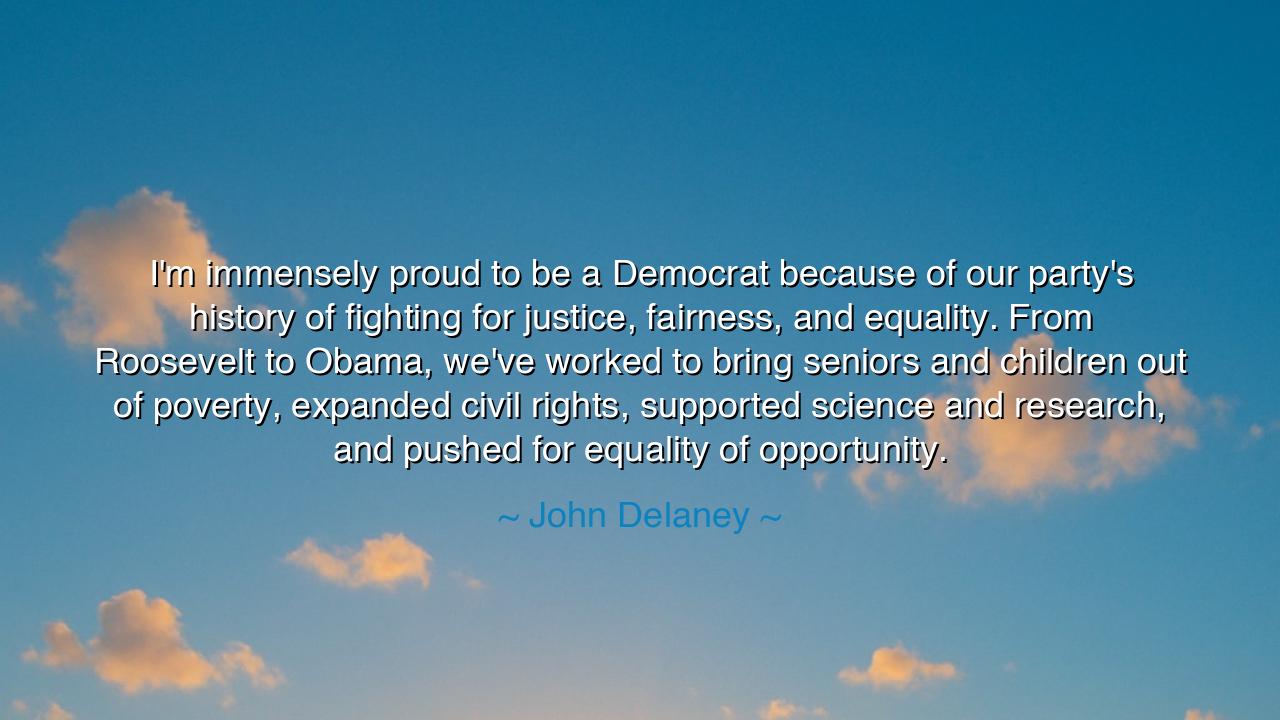
I'm immensely proud to be a Democrat because of our party's
I'm immensely proud to be a Democrat because of our party's history of fighting for justice, fairness, and equality. From Roosevelt to Obama, we've worked to bring seniors and children out of poverty, expanded civil rights, supported science and research, and pushed for equality of opportunity.






In the confident and reflective words of John Delaney, former Congressman and statesman, we hear the echo of civic pride and moral duty: “I’m immensely proud to be a Democrat because of our party’s history of fighting for justice, fairness, and equality. From Roosevelt to Obama, we’ve worked to bring seniors and children out of poverty, expanded civil rights, supported science and research, and pushed for equality of opportunity.” These words are not the boast of partisanship, but the testament of a believer in service and progress, a reminder that political identity—when grounded in purpose—becomes an instrument of moral vision. Delaney speaks as one who looks not only at the present, but through the long corridor of history, seeing how the labor of one generation becomes the inheritance of another.
The meaning of this quote lies in its recognition that justice and equality are not achieved by chance, but by consistent effort across time. Delaney’s pride is not in a party’s power, but in its legacy of compassion and reform. From the New Deal to the Affordable Care Act, from civil rights marches to climate advocacy, he sees a lineage of leaders who fought to widen the circle of opportunity. His words remind us that progress is a relay, not a sprint; each era must carry the torch a little farther toward fairness. To be a Democrat, in Delaney’s sense, is not merely to belong to a political group—it is to commit oneself to the continuous work of uplifting the vulnerable and advancing the common good.
The origin of this sentiment stretches back through the history of democratic governance itself. Delaney invokes names like Franklin D. Roosevelt and Barack Obama, each a symbol of moral courage in turbulent times. Roosevelt, amid the Great Depression, refused to let despair define a nation; he built the New Deal to restore dignity to the working class and hope to the destitute. Obama, emerging from a century scarred by division, reminded the world that the moral arc of history, though long, bends toward justice—but only if people bend it. Between them stand others—Truman, who desegregated the military; Kennedy, who called a generation to service; Johnson, who signed the Civil Rights Act—each a link in the great chain of progress that Delaney honors.
To understand his pride, one must also know the struggle behind it. The march toward equality has never been smooth. Every reform has been met with resistance; every expansion of rights, with fear. When Roosevelt built Social Security, he was called reckless. When Johnson fought for voting rights, he fractured his own party. When Obama pursued healthcare for all, he was met with fierce division. Yet, through it all, the thread of principle endured: that a nation is only as strong as its commitment to the weakest among it. Delaney’s quote is, in this way, a salute not to victory, but to perseverance—to the moral stubbornness of those who refused to turn back.
This idea finds reflection in the story of Eleanor Roosevelt, who once said, “It is better to light a candle than curse the darkness.” She embodied the spirit Delaney praises—transforming compassion into policy, empathy into action. As First Lady, she championed women’s rights, workers’ rights, and the cause of racial equality, often defying her own peers for the sake of principle. In her light, we see the same flame Delaney describes: a belief that government, when guided by conscience, can be a tool for the betterment of humanity. Her example proves that the pursuit of justice is not confined to office or title—it is a calling that transcends time and circumstance.
Yet Delaney’s words are not merely a reflection on the past—they are also a warning for the future. He reminds us that ideals, if untended, wither. Justice must be renewed by each generation, fairness must be defended anew in every era. Pride in history must not become complacency in the present. To claim the mantle of a party—or of any cause dedicated to equality—is to shoulder responsibility, to ensure that the story continues forward. Thus, his quote is not an ending, but an invitation—to learn from those who came before, and to carry on their labor with integrity.
Therefore, O listener, take this lesson to heart: the measure of one’s political or moral identity is not in slogans or allegiance, but in service. Whether you call yourself Democrat, Republican, or none at all, let your actions be guided by the same principles Delaney names—justice, fairness, equality, opportunity. Stand with the poor, defend the voiceless, honor the dignity of every person. The future of nations, like the character of individuals, depends not on power alone, but on compassion tempered by wisdom.
And so, remember the enduring truth behind John Delaney’s words: that progress is not inherited—it is earned. Each generation must decide anew whether to serve itself or to serve humanity. When we choose the latter, we do more than honor history—we become it. And in doing so, we ensure that the torch of justice, passed down from Roosevelt to Obama, from the past to the present, will continue to burn bright for those yet to come.






AAdministratorAdministrator
Welcome, honored guests. Please leave a comment, we will respond soon